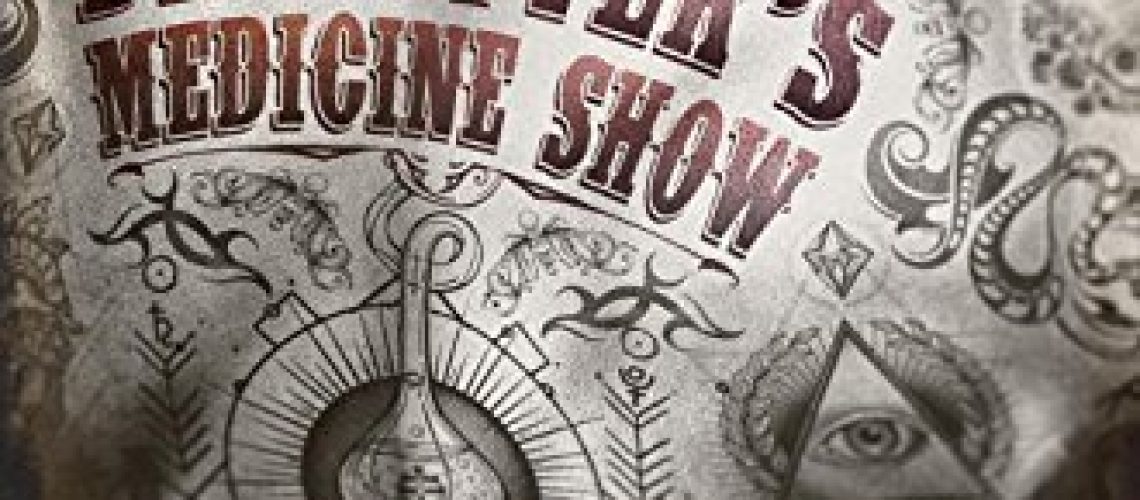The Women’s Christian Temperance Union, a real-life organization that lends a bit of background color to Doctor Potter’s Medicine Show, might have found this novel an effective bit of ammo in their arsenal against the evils of Demon Rum, Wicked Whiskey, Sinful Ginful, etc. They would probably have found it an appalling actual read, but it might have served better than their marching around with signs and their uplifting sermons and their heartfelt testimonials ever did. The descriptions of the unpleasantness of actually being drunk, of addiction, of the consequences of a drinking binge (both social and biological), and of just how nasty a bottle of rotgut can taste and smell, will surely make many a reader look askance at the next cocktail proffered him or her.*
I doubt, though, that Eric Scott Fischl wrote with this aim in mind as he brought these desperate characters together in this diabolical plot. After all, alcohol is not anyone’s biggest problem in his version of Oregon and Idaho in the late 1870s.

Take the titular Dr. Potter, whose name is on the medicine show’s wagons but who is nothing like in charge of the sad little caravan plying the muddy springtime roads of Cascadia. A former sawbones in the Civil War, he’s haunted by traumatic memories of the countless limbs he amputated, the patients he lost, the carnage he witnessed – and he could actually just wish he was still merely a (barely) functional alcoholic and opium addict, like he was during the war.
Or the lovely and talented Mercy, the carnival’s nightingale, singing beautiful operatic arias to the accompaniment of her battered accordion to entertain the yokels between sales pitches. She gave up a possible stage career in Gay Paree to marry a man who was really only interested in her genius scientist father – so he could have said father at his lack of mercy. Oh, and humiliate and hurt and whore her out on the side.
Or Josiah, a grossly drunken, washed-up dentist, whose wife up and followed the medicine show one day, but not for any reason you could possibly imagine, and with unbelievably sad and hideous results.
Or Ag and Sol, two brothers who aren’t cut out for the life of crime they thought they always wanted, unable to hold their liquor, frightened, broke, and really regretting letting Josiah hire them to hare off to Portland to kill a man.
The adventure they all wind up sharing is equal parts Something Wicked This Way Comes and The Hallelujah Trail, but with an unhealthy dose of mad science and or/dark sorcery (aka alchemy, which in this setting is at least sort of real), at least two body-switching madmen trying to live forever no matter who they have to kill along the way, and a whole lot of grotesque metamorphoses, hangovers and horror. There is shocking brutality. There is slapstick hilarity. There are even moments of actual human love and affection, allowing the reader to feel a bit less badly about herself for enjoying it all so much.
See, something for everybody, just like a good medicine show.
The pervading theme of the book, that of the living hell of addiction and bondage (no, not the sexytimes kind), is a hard one to enjoy. No one in this story is wholly free, and few can see a way out of their situations. Most have just given up and accepted the yoke. But the scenes of pity and terror are leavened out, chiefly by the slapstick ineptitude of the wannabe outlaws, but also by some quiet scenes depicting the decency of simple human contact, as characters share a cigarette in the rain, or converse in a hideout, or just share companionable silence when nobody knows what to say, but doesn’t feel the need to fill the air with the wrong words. Most, if not all, of these characters got into their messes via honest mistakes, after all.
If the book has a flaw, for me it’s the chosen style for the narrative: not only is it an omniscient narrator (my least favorite kind), but also one that jumps from one character’s intimate point of view to another without warning and at considerable speed (in some scenes, the POV changes every paragraph), and it’s written in the present tense to boot. These are all things that I usually hate, but Fischl has made them work here. One is never confused about whose POV is being shared at a particular time, for instance, which is a testament to Fischl’s skill. As for the rest, well, my annoyance at the techniques employed here were forgotten by the second chapter, because the characters and their plights were so inherently involving and interesting that I was way more interested in finding out what was going to happen than in any quibbling about how I was being told about it. This is exactly what I want from fiction.
I picked up Dr. Potter’s Medicine Show based on the title alone; a medicine show is maybe my favorite Old West trope, and it all sounded like it was going to be good pulpy fun. Which it is, yes, but it’s also a disturbing and emotional ride of a story, and one that I’ll remember for quite some time.
I have the sequel on tap for review soon here at Skiffy and Fanty, and now I’m really looking forward to it. If it’s anything as good as this one, he has in me a new fan. Check him out. Just, uh, think twice if he offers to sell you anything other than a good story.
*And I’ll throw in this caveat for free: if you’re a sympathetic vomiter, if sensuous descriptions of the act and result of the act of puking makes you puke in turn, either avoid this book or keep a bucket handy.







